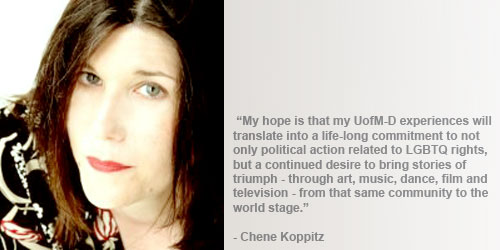
Chene Koppitz is a doctoral student in Womens' Studies and Communication at the University of Michigan Dearborn. She is active in both the women's organizations and the GSA on campus. As a former staffer at the Triangle Foundation, Chene is a seasoned activist for LGBT rights.
1. What is your involvement in the UofM Dearborn student group, and why did you get involved?
I am fortunate enough to be among the leadership team of Women in Learning and Leadership (WILL), which is (for me) not merely an organization, but truly a sisterhood. Much of what WILL does dovetails perfectly with the mission of groups like the Gender and Sexuality Alliance, Amnesty International and several other campus organizations focused on making the campus, our state, our country and our planet safe for ALL its people.
Oddly enough, it was my experience in non-profit work that led me to (unfortunately) realize how so often the oppressed become an even worse oppressor. Behavior demonstrated, was in contradiction to both the organization's mission statement and overarching goals, which guided me toward not only broadening my focus to include Women's and Gender Studies, but to seek out like-minded people with whom I could affect change.
2. How does organizing with a student population differ from your previous work as an organizer at The Triangle Foundation?
Ultimately, it's very similar. Because my professional experience is based in publicity and promotion, I approach organizing from an events-focused angle – and EVERYONE is invited to my party. I try to focus on the commonality of an experience – any experience, positive or negative – and offer a concrete reason to become involved, usually at (as a long-term friend of mine offen says) a "directed self-interest level." I think many people, most people, really do want to be involved politically, be emotionally and intellectually engaged, but sometimes hesitate because they feel like they're not "ready" to commit to such a heady task. For me, I approach every organizing situation by taking a mental snapshot of the moment and remembering the amazing advice of Wilma Mankiller, the first female Chief of the Cherokee Nation: "Meet the people where they are."
3. The LGBT History Project at UofM Dearborn was awesome in October. What impact did it have on the students and the university?
Clearly, I saw immediate impact when I looked out into the audience at various events and saw many new faces, not just people in the GSA or in WILL, but I think the long term impact will be – and is – so much greater than simply attending a lecture. Just as in the general population, I think students on campuses all over America (well, probably not at Bob Jones, but still…) are becoming more and more accepting, not simply tolerant, of LGBTQ people. I have no idea how the years following the push for civil rights appeared on campuses nationwide, but I think this must feel quite similar. I love that we had 40-plus students and faculty for a screening of "Screaming Queens," an amazingly well-done documentary about a little known event in AMERICAN history involving trans activists which pre-dated Stonewall. For me, that's a sign that my country is truly moving toward enlightenment.
4. What do you plan to do with your degree once you finish up at UofM Dearborn?
I specifically broadened my focus to include both Women's and Gender Studies and Communication so I can approach my future using each to complement the other. Whenever I decide to grow-up, I have several paths on which I can tread, but I hope to go back to the film industry, either as a producer of film and television projects related specifically to women, or in festival programming. However, I'd be equally happy if I chose to study law, focusing on human/civil rights.
5. How will you continue working for LGBT rights after your university career?
Any and all human rights work is connected – intellectually, politically, socially and spiritually. In the U.S. we have the clear connection of both the first and second wave of the women's movement being tied to first, the abolitionist movement and second, the civil rights movement. In somewhat concurrent modern history, we have the intersectionality of LGBT, women's and civil rights, so I can't imagine a world, whether on or off campus, in which all of these areas aren't part of my everyday life. Currently, I'm privileged enough to be part of a mentoring program at the Huron Valley Correctional Facility in Ypsilanti and every night we teach, I try to think about what five, ten or twenty years means when so many of your rights don't exist. Is it better, worse or exactly the same if you're an LGBTQ person in that situation? This is just another area of human rights which I've been fortunate enough to consider simply because I'm on a college campus…
My hope is that my UofM-D experiences will translate into a life-long commitment to not only political action related to LGBTQ rights, but a continued desire to bring stories of triumph – through art, music, dance, film and television – from that same community to the world stage.










